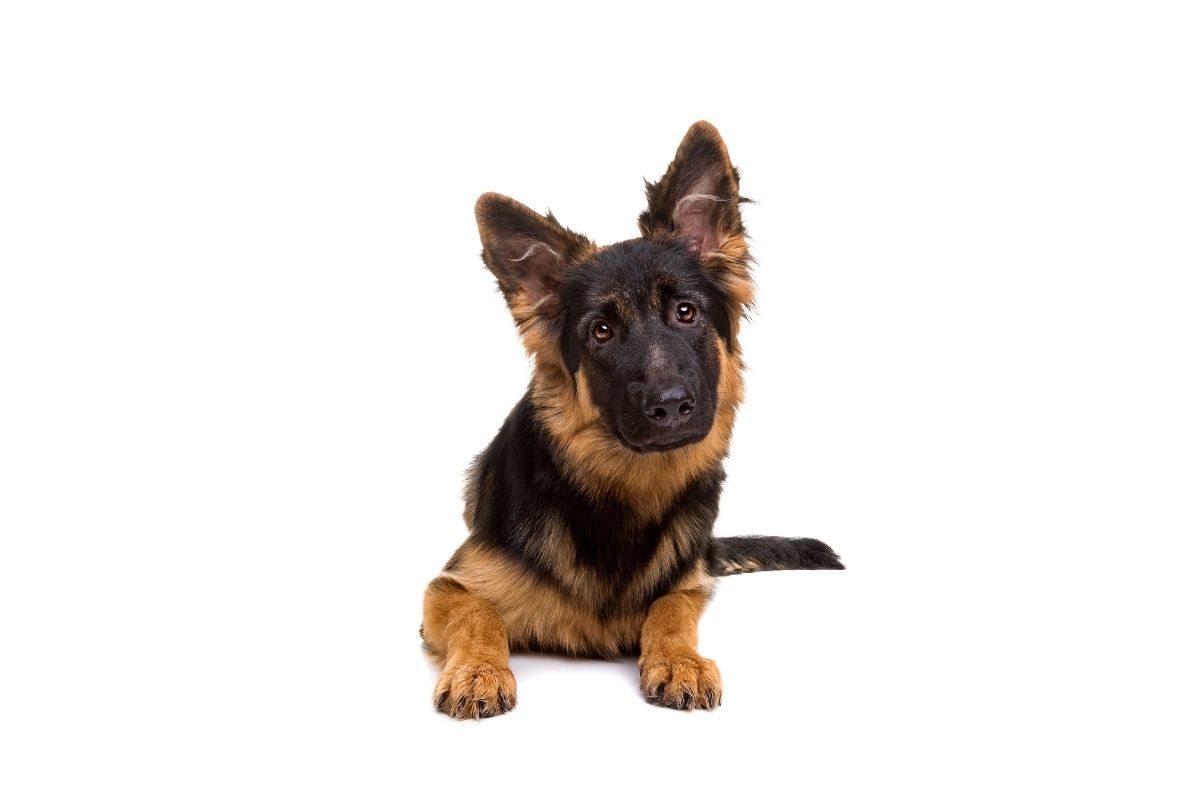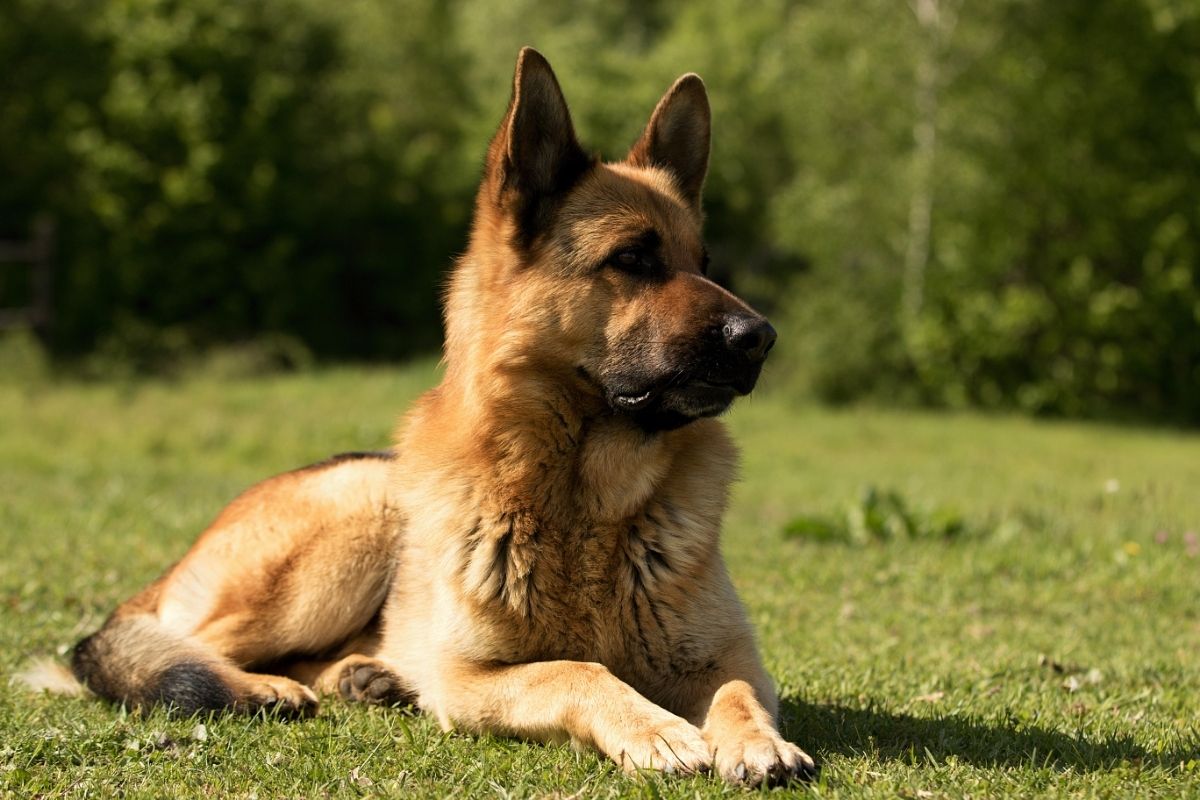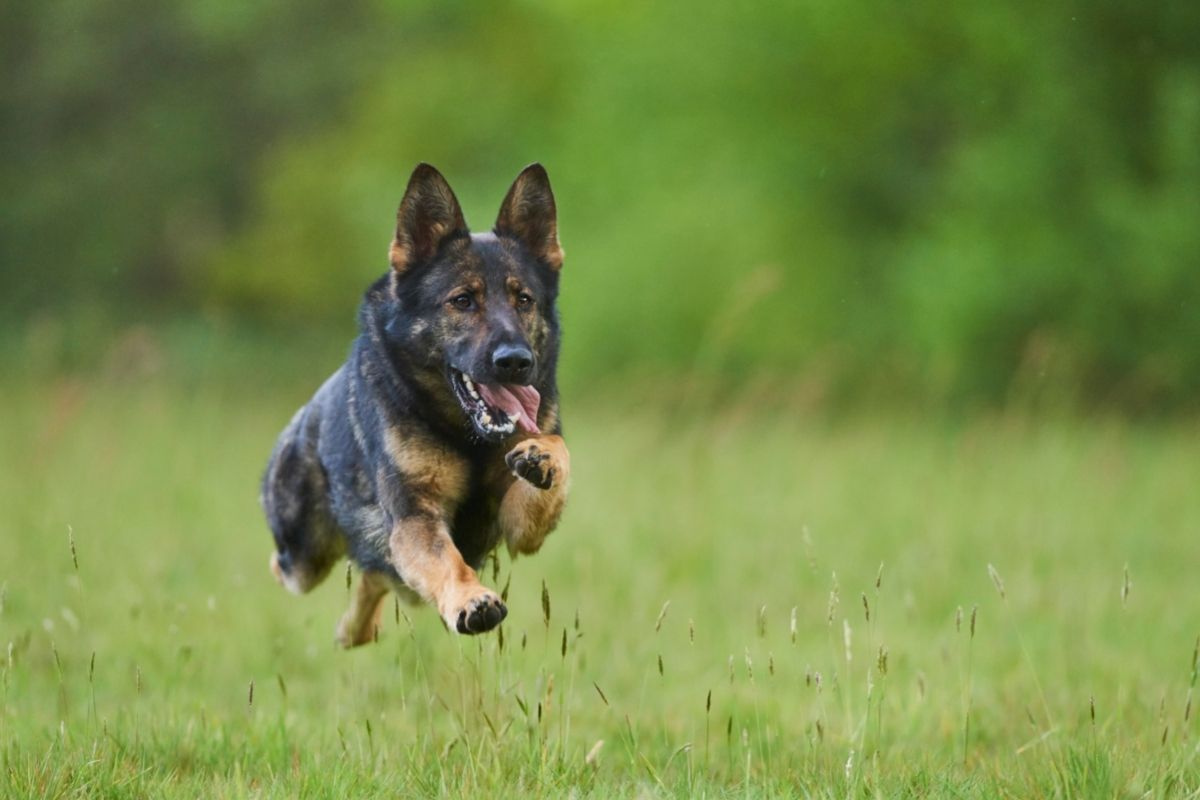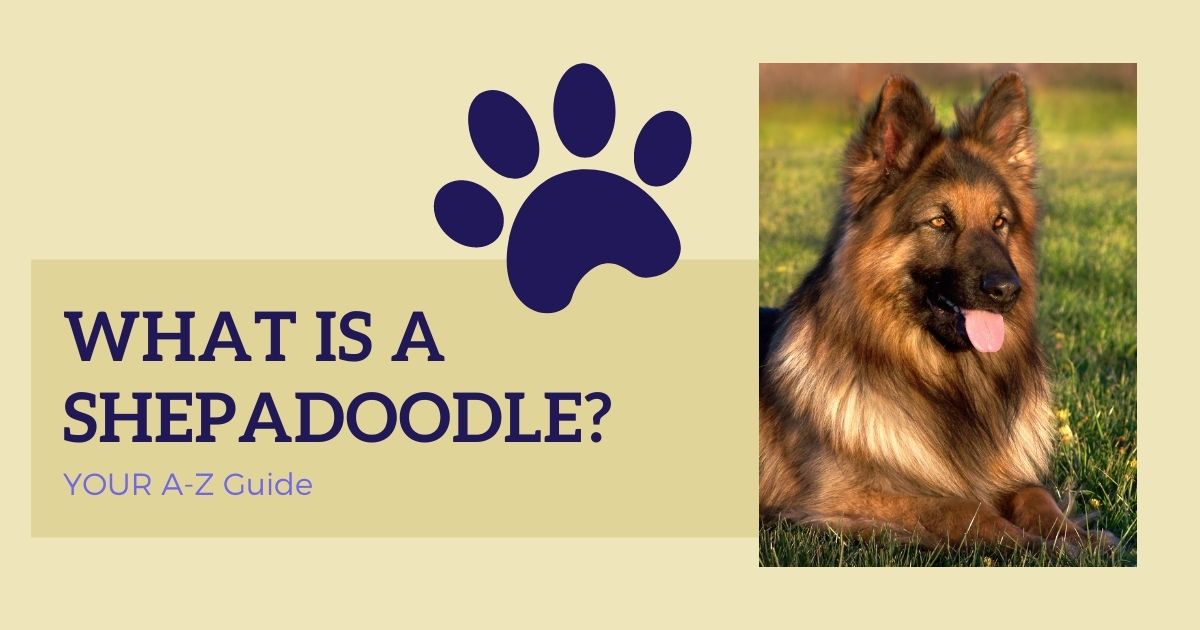What is a Shepadoodle?
We all know the hardworking and intelligent German shepherd and the quick and clever poodle, but did you know that there exists a Shepadoodle? A mix between the two breeds! Also known as a Germadoodle or German Shepadoodle.
If you don’t know yet, take a read below to learn more about this cross of two breeds and learn more Shepadoodle information!

A Quick Guide To Buying a Shepadoodle
During the last couple of years, poodle mixes have become increasingly popular. That goes for the Shepadoodle as well as other “doodles.
Unfortunately, the immense popularity of this breed has led to some ethical people catching on to the fact that there is significant money to be made in breeding these mixes, which “poses” as ethical Shepadoodle breeders.
There are, of course, ethical and beautiful breeders out there breeding Shepadoodle puppies, but it is essential to know what to look out for!
The first thing we need to cover is: What is a Shepadoodle? A Shepadoodle is not an actual breed; it is a German shepherd mixed with a poodle. They can be fantastic dogs, but it is not an actual breed. That’s okay; not everyone wants a pedigree, which is entirely up to each owner.
The issue with Shepadoodles “not being a breed” is that there are no regulations or standards for breeding Shepadoodle puppies. Going back to scrupulous breeders, it can mean that some breed Shepadoodles without proper health testing before and without evaluating the mental traits of the parents.
It can also mean that some puppies are born into horrible conditions, with a much higher risk of developing diseases. It is, of course, not the case with all Shepadoodle breeders at all, but it does happen, and it is essential to ask the right questions of a breeder before buying a Shepadoodle.
Some sound advice before buying any puppy:
- Check the health: Always ask any breeder whether both parents have received the correct medical care throughout their lives and are appropriately screened adequately before breeding.
- See the dogs: A reputable breeder should have no issue with showing off the parent dogs or the puppies. The father-dog may live somewhere else, that is normal, but you should visit the mother and especially the puppies before buying.
- Seek advice: Ask your veterinarian, dog trainer, or even friends and family if they know of an ethical breeder. Remember that some people may have the perfect dog, even if it didn’t come from the right circumstances, so make sure to check everything else still.
- Talk to the breeder: A professional, ethical and dedicated breeder want to talk about their dogs. They are, of course, busy people and don’t have hours all the time, but a good breeder will often love to talk about their dogs and puppies – the good and the bad.
- Ask the internet: We are very hesitant about recommending the internet, as there is a lot of misinformation out there, but a google search is rarely a bad idea. Many people will leave a review somewhere if they have a lot of negative experiences with a particular place. Remember that people are biased, and you are only reading one view!
With all the problematic things covered, let’s look into what a full-grown Shepadoodle is like and everything you should know!
What is the Shepadoodle’s Temperament Like?
The US army developed the Shepadoodle during the 1960s. They wanted a hardworking and brilliant dog that didn’t shed as much as the pure German shepherd. However, the new mix did not gain a lot of popularity due to several reasons.
In the late 1980s, the poodle and Labrador Retriever mix, a Labradoodle, was first made, which caused the reappearance of the Shepadoodle a few years after. Especially during the last decade, the Shepadoodle and other poodle mixes have gained significant popularity worldwide, especially in the USA.
The Shepadoodle will, not surprisingly, get a lot of its characteristics from the two breeds it comes from. A full-grown Shepadoodle is often highly trainable (like both parent breeds), loyal, and active. A Shepadoodle needs a job and lots of mental stimulation to stay happy.
The poodle is a water retriever meant to swim into the water and retrieve shot ducks, and the German shepherd is originally a herding dog used to herd sheep. The poodle and German shepherd have since had many other titles, both used as working dogs and service dogs and excelling in various dog-training fields.
The temperament of an adult Shepadoodle can be challenging to predict completely, as always when you are breeding two very different breeds. But, you should expect a dog that will follow you to the end of the world and work with you from dusk till dawn while being a lovely family companion for you and any children that may come by!
Some temperament issues seen with Shepadoodles include home alone and anxiety issues. Curb this by training your puppy from a young age and getting it used to be home alone and in many different environments and sounds.
Shepadoodles are often amiable dogs and will likely get along with humans and dogs. However, as with all dogs, it is necessary to socialize them from a young age to ensure that they are comfortable around humans and animals.
With some good breeding and some work at home, you will probably have a well-tempered and lovely companion for many years to come!
Do Shepadoodles Shed?
As with many doodle-mixes, the poodle German shepherd mix has become quite popular due to the enticing idea of a non-shedding or minimally shedding dog. A Shepadoodle dog is likely to shed less than other breeds, but it is important to note that some Shepadoodle dogs do indeed shed.
When you breed two dogs, their offspring will be a mixture of their genes. Shepadoodle puppies may take mostly after the poodle’s non-shedding genes, or they may take from the German shepherd genes. There is no way of predicting it.
Suppose you are buying a Shepadoodle from several generations of Shepadoodles. In that case, it is, of course, more likely that a breeder will be able to anticipate the fur type of the Shepadoodle puppies. But genes are unpredictable, so a gene from the German shepherd may suddenly “decide” to appear several generations down.
Suppose you are looking to buy a Shepadoodle due to allergies in the family. In this case, you should spend time with other Shepadoodles before purchasing a puppy to minimize the risk of having to rehome the puppy later on due to allergies.
The Physical Characteristics of The German Poodle Mix
As a mix between two very different breeds, at least when it comes to looks, each Shepadoodle will be unique – even within the same litter of Shepadoodle puppies!
Some puppies look more like their poodle ancestry than their German shepherd ancestors. The fur can vary from short and straight to long and curly.
This cross will often be pretty large, even if bred with a smaller poodle size, with floppy ears and brown eyes. The tail usually assembles the tail of a German shepherd, however, with varying fur lengths.
What Are the Three Different Types of Poodle German Shepherd Mixes?
As with many doodle designer breeds, the Shepadoodles come in different sizes, depending on which poodle size you’ve bred the German shepherd with. The three sizes you will most often see are:
- Standard Shepadoodle.
- Mini Shepadoodle.
- Toy Shepadoodle.
Be extra vigilant if you are looking to buy a mini or toy-sized adult Shepadoodle as there are additional health issues to be aware of when you choose to breed a large dog like a German shepherd with a small breed like a Toy or Toy Mini poodle.

Pros and Cons of Owning a Shepadoodle
As with all breeds, there are pros and cons to owning a Shepadoodle.
Pros
- Friendliness: Generally, these curly-haired bounce balls are friendly and affectionate with the whole family. If taught from a young age, they also love being around other animals.
- Excellent Guardian: Although it can vary greatly, adult Shepadoodles tend to be vocal dogs. They are excellent guard dogs and will alert you to anyone getting near your property.
- Trainability: If you are looking for an easy-to-train dog, then the Shepadoodle is one to consider. Being a mix of two hardworking and very intelligent breeds, you’ve got yourself a work buddy!
Cons
- Anxiety: Shepadoodles tend to form powerful bonds with their families, which can mean that they can have an increased risk of suffering from anxiety when left home alone and in different circumstances.
- High-energy: Being from intelligent and active breeds, this poodle German shepherd mix needs a lot of mental and physical stimulation.
- Not suitable for apartments: Being high-energy and quite vocal and a larger dog, the Shepadoodle is not well-suited for apartment life.
Sizes and Weights of Adult Shepadoodles
As the Shepadoodle is not a registered breed, there are no standards for how big a full-grown Shepadoodle should be. It is, therefore, sometimes difficult to determine how big your Shepadoodle will turn out to be, although it can be estimated a lot from the parents’ size. If your Shepadoodle is multi-generational, it is, of course, easier.
As a rule of thumb, you should expect your adult Shepadoodle to be:
- 22-28 inches (56-71 centimeters).
- 50-90 pounds (23-42 kilograms).
The weight and size vary so much because they depend on which parent genes are the dominant ones. If the German shepherd genes dominate, the dog will have a bulkier frame, whereas a poodle often has a more slender frame. No matter what, you should expect your dog to be considered a large dog.
Health Issues Associated with Shepherd Doodles
As we’ve said many times before, one of the biggest concerns with all the new (and old) poodle mixes appearing these days is that they are too frequently not appropriately bred, resulting in unhealthy individuals. The same worry goes for Shepadoodles, even if they are lovely dogs.
The most important way to prevent dealing with future health issues is to find an ethical and thorough Shepadoodle breeder. A breeder knows the risk associated with bringing two different breeds with different health issues together.
Both parents should be health checked thoroughly before breeding and screened for genetic diseases relevant to the poodle and the German shepherd breed.
Unfortunately, even with all the proper tests done, there are always some health issues that may appear. The most important ones to be aware of in Shepadoodles are:
- Panosteitis: A bone disease-causing inflammation in the long bones, often the humerus.
- Hip dysplasia: A common disease where the bones of the thigh and the hip joint does not fit properly together.
- Patella Luxation: A condition where the kneecap is loose.
- Hemophilia: A blood disease causing an increased risk of bleeding.
- Gastric Dilation and Volvulus (GDV): An emergency condition where the stomach becomes gas-filled and possible rotate.
- Progressive Retinal Atrophy (PRA): A degenerative disease that affects the eyes, resulting in complete blindness.
- Food intolerance and allergies: Allergic reaction to specific food components (most commonly beef or dairy) or environmental factors.
- Diabetes: An endocrine condition where the dog cannot correctly control its blood glucose levels.
Besides the conditions mentioned above, ensuring your dog receives tick and flea preventive treatment and vaccines directed by your veterinary healthcare provider is also always relevant. A Shepadoodle should also be seen by a veterinarian for a general health checkup at least once a year; that’s the best way to prevent diseases.
How to Care for a Shepadoodle
Being very active and intelligent dogs, Shepadoodles need a lot of stimulation, physically and mentally, every day of their life to keep them happy and healthy. We have, of course, gathered the essential information here, but it is also always advisable to seek advice from owners, breeders, and trainers with experience with Shepadoodles!
Note: The below is generalized advice. Your dog may have different needs. If in doubt, we recommend contacting your veterinarian.
Dog Food
All dogs should preferably receive high-quality dog food, either kibble or wet food, depending on the owner’s preferences. You can choose to make your dog food if you want. In that case, it is advisable to seek advice from a veterinarian that specializes in nutrition to ensure your dog receives the correct nutrients.
When you want to give your dog something extra delicious or training time, it is a great idea to have some high-value treats available – it will make learning even more fun for your Shepadoodle!
Love and Time
Your Shepadoodle will be a very affectionate dog that greatly bonds with its family. Make sure you have plenty of time for your new best friend to love him. A dog should never be left alone for more than eight hours, and if you prefer your dog to stay outdoors or in a kennel most of the time, the Shepadoodle is not the right dog for you.
Fun Facts About Shepadoodles
Shepadoodles are not the most common type of dog, so we’ve gathered a few fun facts to tell people when you explain who your new best friend is:
- The US Army initially made the breed in the 1960s.
- Almost all Shepadoodles will have brown eyes.
- The most common color of Shepadoodle is cream or black, but sometimes they can look just like curly-haired German shepherds!
The Maintenance and Grooming Needs of Shepadoodle Dogs
We’ve already talked about how the coat of a Shepadoodle can be unique to each dog. Some come with curls and some with a far wavier fur in different lengths. With so many ways the coat can turn out, the grooming needs fluctuate a lot!
The majority of Shepadoodles will need significant grooming, either by you or a professional groomer, to prevent matting and other issues that may arise. Don’t worry, though; it is not as difficult as it may look at first glance!
Brushing
Your Shepadoodle will need brushing twice a week to prevent fur matting. Especially if you have a curly Shepadoodle that doesn’t shed a lot, the hairs will still break and get caught in the curls (along with dirt and dust), so make sure you brush it thoroughly.
Bathing
Your Shepadoodle will need a bath now and then to keep dirt out of the curls. Most people recommend it every fourth week, but it can depend on the dog. You should bathe your dog and wash it with perfume-free shampoo. Also, if you want to make the brushing easier for you and your Shepadoodle, it is well worth your time to buy conditioner for dogs!
Trimming
Whether your Shepadoodle sheds a lot, it will probably have some genes from the poodle and will need frequent trimmings. Using scissors and a machine to trim your dog can be tricky initially, but trust me, you can learn how to do it. Especially if you don’t mind your dog looking a little odd the first few times you try your hand at it.
You will also need to trim your dog’s claws now and then. It doesn’t have to be a weekly occurrence, but make sure you keep on top of it. More importantly, make sure your dog gets used to having a pedicure while still a puppy; it can help prevent future issues!
Toothbrushing Time
Besides regular grooming, your Shepadoodle should also have its teeth brushed. The ideal is to brush the teeth twice a day, just like we humans do, with a toothbrush and toothpaste made for dogs. Do not use toothpaste made for humans as it can be toxic to dogs.
The Shepadoodle’s Exercise and Training Needs
We’ve already talked about how active and intelligent a Shepadoodle is. To keep your Shepadoodle happy and out of trouble, it must get activated throughout its life, of course, adapted to suit the temperament and age of each dog.
Exercise
Your Shepadoodle should receive plenty of exercises every day, preferably spread out on two to three daily walks. If possible, your dog should also be allowed to run free at least twice weekly to do it safely.
Besides walks, there are plenty of ways to exercise your dog. Once your Shepadoodle is fully grown, you can exercise your furry friend in many ways:
- Runs.
- Hiking.
- Bike rides.
- A swim.
Your healthy Shepadoodle will more than likely be up for it all!
Mental stimulation
A Shepadoodle is a knowledgeable dog; it will need plenty of mental stimulation. Mental stimulation doesn’t have to be only training with a dog trainer. It can also include training circus tricks, searching for kibble food in the garden, finding hidden treats indoors, or playing hide-and-seek with its favorite humans.
Starting with puppy obedience training is always a great way to get started on the mental stimulation, and it may even get you hooked on dog sports!
Most Shepadoodles will probably excel at different dog sports as well. Some of the most common ones where a Shepadoodle will have a field day include:
- Obedience training: The most common dog training involves walking nice at the heel, lying down, retrieving items, etc.
- Rally training: A more “trick-based” dog sport, where you and your dog have to complete a course with up to twenty different tasks throughout.
- Agility: Agility is a lot like an obstacle course for dogs, where your dog will have to run fast, jump over obstacles, through a tunnel, or slalom through sticks as quickly as possible.
- Nose work: A relatively new idea, a dog trainer will help you teach your dog to sniff out particular objects and smells. Using its nose will tire your dog out in the best way!
If you require some excellent ideas, you can always ask your veterinarian and fellow dog owners or look up online whether there are some suitable options for you and your dog nearby!

The Final Yap
If you are looking for a hardworking, intelligent, high-energy dog who will love you and your family, the Shepadoodle may be your perfect companion. Remember to always look out for the right breeder and puppy to ensure you will have plenty of great years with your new curly best friend!
